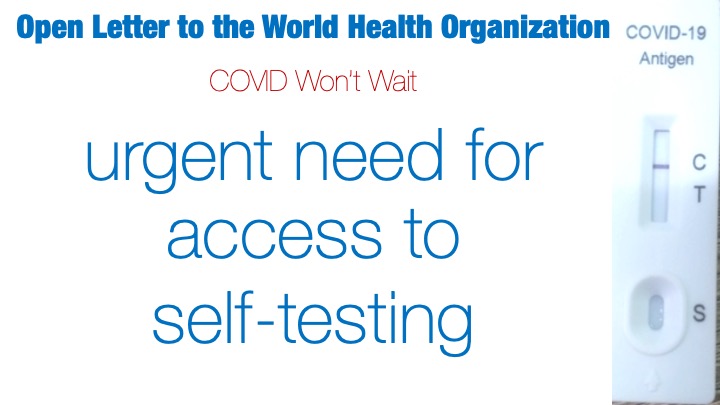SHOBHA SHUKLA, BOBBY RAMAKANT - CNS

How will people know if they are positive for COVID-19 without testing be made available, accessible to everyone?
(Image by CNS) Details DMCA
If we get infected with an infectious disease, will we not want to protect our family and others from it? But, unless we know our disease status timely and reliably, how can we help prevent further infection transmission? How will we link up, and benefit from, health and clinical care pathways until we know ourselves that we are infected? When self-tests for COVID-19 are available, there is no excuse not to make them affordable and accessible to everyone without any further delay, so that these easy to use tests can complement the confirmatory RT-PCR tests and other diagnostics for those who need them - and serve as an entry point for health and clinical care pathways.
That is why more than one hundred global organizations and experts have issued an open letter calling upon the United Nations health agency (World Health Organization - WHO) to authorize and recommend the use of COVID-19 rapid antigen detection tests for self-testing in low- and middle-income nations. People should be able to know their COVID-19 status in a simple, cheap and non-discriminatory manner. Such an information will help them to take prompt action to break the chain of onward infection transmission, and rapid linkage to healthcare pathway will be another important outcome of this, argues this open letter that was issued towards the end of January 2022.
Why self-test?
More than 10 billion COVID-19 vaccine doses have been administered globally in a world of over 7 billion people. But more 3 billion people have yet to receive even their first dose. Vaccine inequity has cost unnecessary human suffering and untimely deaths. Now, inequity in accessing self-tests is a looming danger we cannot, and must not, have to deal with if we are to deliver on the tall promise of health for all where "no one is left behind".
85% of global population lives in low- and middle-income nations yet only 40% of COVID-19 tests were done in these places. "The reported average per capita daily testing rate of high-income countries is nearly 10 times higher than that of middle-income countries and close to 100 times higher than that of low-income countries" reads the open letter.
In Africa alone, 85% of COVID-19 infections are going undetected according to WHO. This inequity in access to the diagnostic tools that trigger life-saving individual and public health measures is part of the same 'medical apartheid' that has plagued the rollout of COVID-19 vaccines, added the open letter.
Self-testing is a necessary tool to enable rapid linkage to care and initiation of outpatient treatment to prevent hospitalisation and death, especially among those at high risk of disease progression.
(Note: You can view every article as one long page if you sign up as an Advocate Member, or higher).





